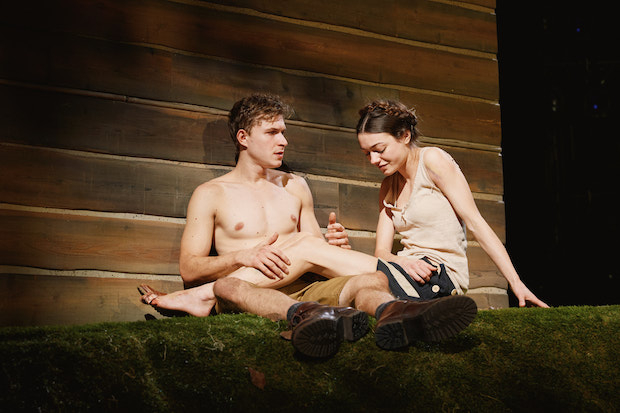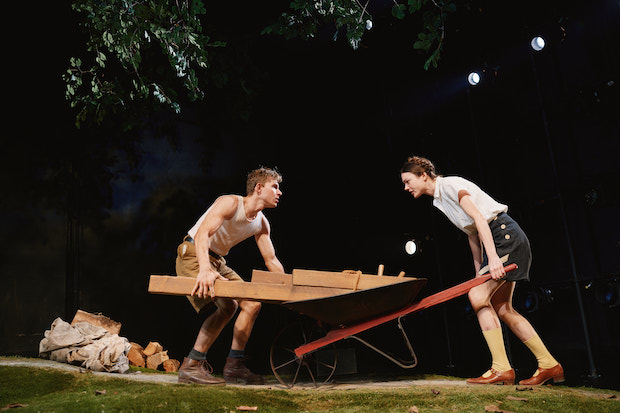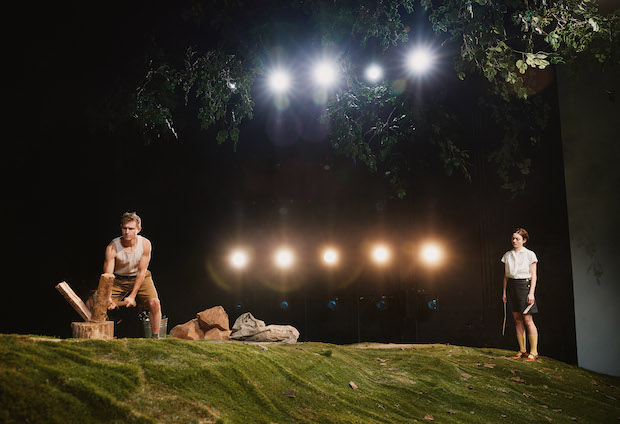Review: Camp Siegfried Takes Us to Long Island's Premier Nazi Summer Camp

(© Emilio Madrid)
We've all done it. You meet someone and click — and then you immediately imagine your future together: wedding day, babies, and a charming white-picket-fence home in a subdivision reserved exclusively for the volk. OK, maybe not that last part — unless you're one of the two characters in Bess Wohl's Camp Siegfried, now making its New York debut at Second Stage Theater. Based on the real summer camp the German-American Bund ran at Yaphank, New York, in the late 1930s, it sets a cliché story of summer lovin' in a dark corner of American history most people would prefer to forget — especially those who were actually there.
The relationship is so garden-variety that Wohl has named her characters "he" and "she." They first meet over blaring Oompah music (on-the-nose sound design by Christopher Darbassie). Wallflower she (Lily McInerny) clings to her beer mug and tries not to be noticed, but he (Johnny Berchtold) is clearly smitten. Even if she won't dance with him tonight, he wants to see her again. When he asks where she's staying, she nonchalantly responds, "Oh, all the way over on Hitler" (which was indeed an actual street in the "German Gardens" neighborhood at Yaphank).
Friction over camp activities (like building a wooden pier) lights a spark that becomes the flame of young romance: He helps her learn German through the recitation of Nazi slogans and she helps him lose his virginity. She is 16 (going on 17) and he is 17 (going on 18). They delight at the prospect of an accidental pregnancy that will result in a new Aryan baby. But we suspect that this is all intoxicating delusion that will end in what Lana Del Rey might have called Sommerzeit Traurigkeit — had she too attended a Nazi summer camp.

(© Emilio Madrid)
"Young Nazis in love" has emerged as a theme this season following the return engagement of Rita Kalnejais's This Beautiful Future. Wohl covers similar territory in a story that reveals how male feelings of inadequacy fuel extremist politics, and how the chemical rush of infatuation can lead us to make all kinds of bad decisions. It also asserts, with 20/20 hindsight, our inability to predict the future with any real accuracy. This is a worthwhile subject to ponder at a time when so many claim to be on the right side of history.
Unfortunately, most of these insights feel warmed-over in this 90-minute two-hander, which seems more like an early draft with a promising concept (it is apparently the third iteration, following a two-person version that played London in 2021 and a six-character version that never saw the light of stage). Camp Siegfried is not in the same league as other Wohl plays like Small Mouth Sounds, Make Believe, and Grand Horizons, all of which cast new light on their subjects by approaching them at strange angles. This take on summertime seduction is certainly novel, but the progression from meet-cute to Nazi rally is surprisingly inert, with each succeeding development feeling more contrived than the last.
The performers are blameless: McInerny delivers an appropriately gangly, achingly nervous, and unmistakably contemporary performance as a young woman navigating the push-pull of sexual attraction. The two actors have legitimate chemistry, despite (or perhaps because of) the little-brother anxiety that radiates off Berchtold as he rips up the artificial grass with his fingers.

(© Emilio Madrid)
They have the misfortune of acting on the most horrendous set to presently (dis)grace an off-Broadway stage. Brett J. Banakis dominates the space with a large turf-covered knoll, with the side and upstage walls of the theater exposed. A few tree branches hang lamely over the house to invite us into the patently artificial nature. Perhaps Banakis is trying to convey the message that the romantic stories we tell ourselves are based on lies that can be seen clearly if we bother to open our eyes — but this visual metaphor detracts from basic storytelling needs, something that becomes painfully obvious as we watch the two actors awkwardly grapple around the footlights (lighting by Tyler Micoleau) in a climactic scene that is pushed far downstage in front of the knoll.
Long blackouts take place between scenes, covered again by loud German music. And even though the performers exert considerable effort building a wooden pier center stage, a second one inexplicably appears stage right for a final scene. It ends with tepid applause, the audience not entirely sure that it has witnessed a complete play. It's hard to believe that something this messy and shapeless was directed by the usually exacting David Cromer.
In the end, Camp Siegfried is most undermined by its caution: It holds the characters at arms-length and allows us to examine their fling from a safe distance. Contrary to what some critics have recently argued, artist have no responsibility to shield the public from moral danger — they are not priests (just ask Bruce Norris). A more dangerous production might make us feel the exuberant emotional high that is driving these young people. It would certainly make for a more memorable theatrical experience. But the team behind Camp Siegfried plays it safe, ensuring that, like the Nazi summer camp patronized by thousands of New Yorkers, it will be forgotten.










